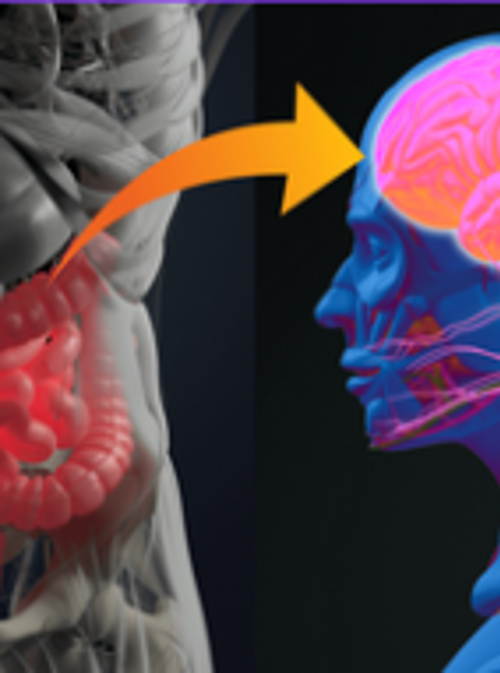
News
Key messages in gut health: what you need to know
Gut health is a hot topic in today’s world, as more and more people are becoming aware of the crucial role it plays in our overall well-being. But with so much information available, it can be hard to know what to pay attention to. This blog post will help you understand the key messages in gut health that you need to know to be able to communicate with your patients. We’ll cover everything from the importance of maintaining a diverse gut microbiome, to the role of food intolerance tests, and more. Whether you’re looking to improve the gut health of your patients, or simply want to stay informed, this blog is for you.

1. Inclusion not exclusion – improving gut health is about adding more to the diet
Many patients with gut symptoms are quick to remove several foods or food groups from their diet. This can leave them with an overly restricted diet which does more harm than good to the gut microbiome. The diversity of the gut microbiome equates to better gut health and including more foods in the diet is key to increasing this diversity.
The composition of the gut microbiota is unique to everyone, and diet is a key modifiable factor influencing the composition1. Although daily fluctuations in diet are observed, it is the impact of habitual diets that have a greater influence on the gut microbiota. This was demonstrated in the American Gut Microbiome Research Study2 which showed that those who ate more than 30 different plant-based foods per week, had a far more diverse gut microbiome compared to those who ate less than 10.
Plant-based foods are those which contain dietary fibre; fruits, vegetables, wholegrain carbohydrates, beans and lentils, nuts and seeds, and even herbs, spices, onion and garlic contribute. The aim should be to encourage patients to include as wide a variety of these foods as possible into their diet, rather than excluding any food groups such as gluten-containing carbohydrates, which are a good source of dietary fibre, and which are often the first to go.
TOP TIP: Some tips to help increase plant diversity include choosing different coloured peppers, rather than always red, adding a tin of mixed lentils into a stew, buying a bag of mixed lettuce leaves rather than always romaine, or snacking on mixed nuts, rather than just peanuts.


2. The brain can impact the gut – understand the role of the gut-brain axis in gut health
The brain can impact the functioning of the gut via the gut-brain axis; a two-way communication pathway in which the brain and the gut are constantly communicating with each other. When as humans we have a stable mental status, it has been shown that we also have a functional microbiota, an intact gastrointestinal lining, and controlled inflammation3. This leads to normal transit time, frequent bowel movements, and typically the absence of any unwanted gut symptoms such as abdominal pain, bloating, or change in bowel habits.
However, in those with functional gut disorders such as irritable bowel syndrome (IBS), there is a miscommunication between the gut and the brain and a disruption to the gut-brain axis. This can then lead to a dysfunctional microbiota and increased intestinal permeability (leaky gut) which allows for translocation of antigens and metabolites which can impair immune function. Increased stress and raised cortisol levels leads to visceral hypersensitivity of the gut via the sensory nerves. This causes altered gut motility and unwanted gut symptoms such as bloating, diarrhoea or constipation.
Overall, it is estimated that more than 40% of people worldwide suffer from functional gut disorders4, with IBS affecting 11% of the global adult population5. The severity of symptoms can significantly lower patients’ quality of life and present a burden to primary and secondary care consultations, leading to increased rates of investigations and treatments, and an increase in direct healthcare costs6.
Top Tip: When assessing a patient, think beyond the gut and diet, consider their full lifestyle and ask questions wider than dietary patterns?
3. Diet isn’t the only answer to improving gut health – targeting the brain can have a powerful impa
At present, the management of functional gut disorders relies on the fixing of symptoms, focusing primarily on dietary intervention as per NICE guidance7. However, the key to developing effective treatments is understanding the pathophysiology of these disorders, to be able to target the gut-brain connection and break the chronic stress cycle leading to visceral hypersensitivity, altered gut motility and microbial dysbiosis.
There is now a growing body of evidence to demonstrate the effectiveness of non-dietary approaches to improving gut health. These approaches include practices such as meditation8, cognitive behavioural therapy (CBT)9, yoga10, hypnotherapy11, and breath work12. They all involve stimulation of the vagus nerve which connects the gut and the brain, activating the parasympathetic nervous system and improving gut symptoms.
Without understanding or knowledge of these more holistic practices, in clinical practice it can feel daunting to recommend them to patients. However, understanding the science of how they work and communicating this clearly to patients can be a helpful tool in the start of their gut health journey.
TOP TIP: As a starting point, it can be useful to point patients in the direction of helpful tools if they are interested in exploring these options further. Apps such as Calm or Headspace offer introductory courses to mindfulness meditation, YouTube is also a great place for yoga videos and breathing videos, and the app Nerva is a scientifically researched gut-directed hypnotherapy app. CBT is already recommended as the next step of referral for patients with IBS if there has been no improvement in gut symptoms after 12 months of dietary and medical management of the condition.


4. Food intolerance tests – are they worth it? I’d argue, no.
Despite having an understanding on all the above, patients are often still after a quick fix for understanding and improving their gut health, often pointing the finger at specific food intolerances. Food intolerances are far more common than food allergies and coeliac disease combined, affecting as many as 20% of adults13. Although they’re not life-threatening, food intolerances can significantly impact a patient’s quality of life as well as relationship with food – so it’s worth getting on top of them. A scan of Google Trends reveals that searches for food intolerance testing have increased by 250% over the past year. But are they really worth it?
At best, they are a waste of hard-earned cash and, at worst, can be potentially damaging to physical and mental wellbeing. Despite the convincing marketing claims, there is no valid test for a food intolerance, with the exception of lactose intolerance diagnosed via a hydrogen breath test14. Take for instance, IgG food intolerance tests. This test involves exposing a sample of blood to different foods and measuring the resulting antibody (IgG). However, most of us will develop IgG antibodies to food during our lifetime, despite not getting symptoms. This is because IgG is an indicator of repeated exposure, not a food intolerance15. Other methods of food intolerance testing such as using a hair sample, or kinesiology have no evidence whatsoever so should never recommended. There is also no regulation of food intolerance testing, so many of those available to buy online have no science behind them. Of course, if a patient completely changes their diet based on the results of these tests, their symptoms may temporarily improve. However, symptoms often return, and an overly restricted diet is unsustainable, and as we learnt in the beginning, more harmful to gut health long term.
TOP TIP: Food intolerance tests are not worth it as there is no scientific evidence to support their accuracy or effectiveness. Elimination diets and working with a qualified healthcare professional are better approaches to identifying and managing food intolerances.
For more information and resources to help support your patients to look after their gut health, Yakult Science for Health have a large collection of different materials that can be found. For a deeper dive into the science, these resources are a great start:
· Probiotic Toolkit: How to Choose a Probiotic
· Webinar: The Gut Brain Axis Explained
· Microbiome Matters Podcast Episode: Food, Mood and The Gut Microbiome
· Guides to: Fibre, Fermented Foods, Probiotics, Prebiotics
The Love Your Gut website also has lots to offer. This includes a healthcare professional specific pack, and information for patients, including recipes. My favourite resource is their Food, Mood & Symptoms Diary – one of the best methods for allowing your patients to identify foods or food patterns that may be triggering the development of their symptoms
About the Author: Kaitlin Colucci is a UK Registered Dietitian specialising in gut and digestive health, as well as general health and wellbieng. She is considered one of the leading gut health experts in her field.
References
- Leeming ER, Johnson AJ, Spector TD, Le Roy CI. (2019) Effect of Diet on the Gut Microbiota: Rethinking Intervention Duration. Nutrients. 11(12):2862.
- McDonald D, Hyde E, Debelius JW, et al. (2018) American Gut Consortium; Knight R. American Gut: an Open Platform for Citizen Science Microbiome Research. mSystems. 3(3):e00031-18.
- Carco Caterina, Young Wayne, Gearry Richard B., Talley Nicholas J., McNabb Warren C., Roy Nicole C. (2020) Increasing Evidence That Irritable Bowel Syndrome and Functional Gastrointestinal Disorders Have a Microbial Pathogenesis. Frontiers in Cellular and Infection Microbiology. Vol 10.
- Sperber AD, Bangdiwala SI, Drossman DA, Ghoshal U (2020) Worldwide prevalence and burden of functional gastrointenstinal disorders, results of rome foundation global study. Gastroenterology. Doi: 10.1053/j.gastro.2020.04.014.
- Enck P, Qasim A, Giovanni B, Adam FD, Shin F, Emeran MA, et al. (2016) Irritable bowel syndrome. Nat. Rev. Disease Primers 2, 16014-16014.
- Tack J, Stanghellini V, Mearin F, Yiannakou Y, Layer P, Coffin B, et al. (2019) Economic burden of moderate to severe irritable bowel syndrome with constipation in six European countries. BMC Gastroenterol. 19:69.
- National Institute for Health and Care Excellence. 2008. Irritable bowel syndrome in adults: diagnosis and management. [CG61]. London. National Institute for Health and Care Excellence.
- Sun Y, Ju P, Xue T, et al (2023) Alteration of faecal microbiota balance related to long-term deep meditation.General Psychiatry. 36:e100893.
- Everitt HA, Landau S, O'Reilly G, Sibelli A, Hughes S, Windgassen S, Holland R, Little P, McCrone P, Bishop F, Goldsmith K, Coleman N, Logan R, Chalder T, Moss-Morris R (2019) ACTIB trial group. Assessing telephone-delivered cognitive-behavioural therapy (CBT) and web-delivered CBT versus treatment as usual in irritable bowel syndrome (ACTIB): a multicentre randomised trial. Gut. 68(9):1613-1623.
- Schumann D, Langhorst J, Dobos G, Cramer H. (2018) Randomised clinical trial: yoga vs a low-FODMAP diet in patients with irritable bowel syndrome. Aliment Pharmacol Ther. 47(2):203-211.
- Peters SL, Yao CK, Philpott H, Yelland GW, Muir JG, Gibson PR. Randomised clinical trial: the efficacy of gut-directed hypnotherapy is similar to that of the low FODMAP diet for the treatment of irritable bowel syndrome. (2016) Aliment Pharmacol Ther. 44(5):447-59.
- Jie L, Chaolan L, Wei W, Yizhou H, Bo W, Jiashuang T, Chenyu S, Yue Y. (2022) Slow, deep breathing intervention improved symptoms and altered rectal sensitivity in patients with constipation-predominant irritable bowel syndrome. Frontiers in Neuroscience. 16.
- Tuck CJ, Biesiekierski JR, Schmid-Grendelmeier P, Pohl D. (2019) Food Intolerances. Nutrients. Jul 22;11(7):1684.
- Smith E, Foxx-Orenstein A, Marks LA, Agrwal N. (2020) Food Sensitivity Testing and Elimination Diets in the Management of Irritable Bowel Syndrome. J Am Osteopath Assoc. Jan 1;120(1):19-23.
- Gocki J, Bartuzi Z. (2016) Role of immunoglobulin G antibodies in diagnosis of food allergy. Postepy Dermatol Alergol. Aug;33(4):253-6.